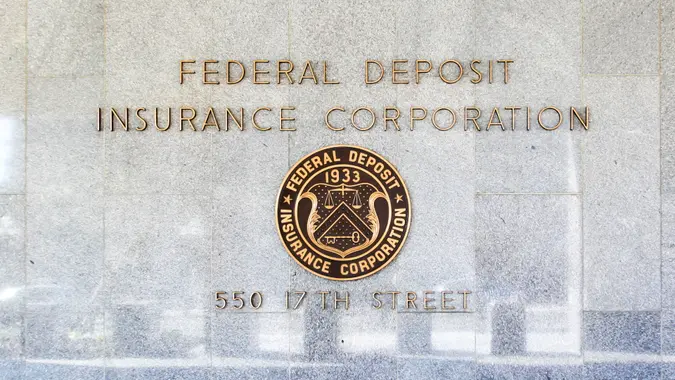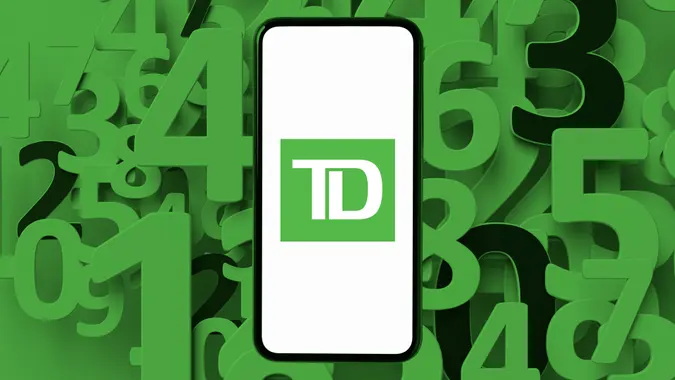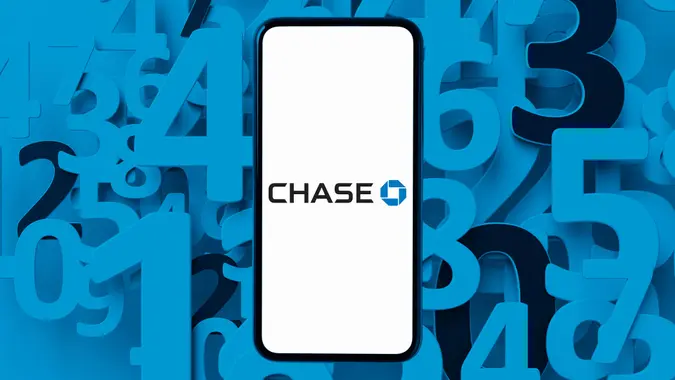NCUA vs. FDIC: What’s the Difference?

Commitment to Our Readers
GOBankingRates' editorial team is committed to bringing you unbiased reviews and information. We use data-driven methodologies to evaluate financial products and services - our reviews and ratings are not influenced by advertisers. You can read more about our editorial guidelines and our products and services review methodology.

20 Years
Helping You Live Richer

Reviewed
by Experts

Trusted by
Millions of Readers
With the volume of ads for banks shown online and on television, you undoubtedly have heard the term “FDIC insured.” That’s the guarantee that the federal government makes to you that your money is safe — to a certain amount — in case of bank failures.
But if your “bank” is a credit union, does the guarantee still apply? Yes.
The credit union version of the Federal Deposit Insurance Corp. is the National Credit Union Administration, or NCUA. The FDIC and NCUA are alike in that they insure all deposit accounts up to $250,000, per person and per ownership category, at participating banks and credit unions.
Not all banks and credit unions are enrolled with the FDIC or NCUA, so that’s a question that should be asked before opening an account.
Keep reading to find out the details of FDIC vs. NCUA insurance and learn how your money is protected. Find out if your account is covered whether you keep your money with a credit union or a bank.
How Much of Your Money Is Protected by FDIC or NCUA?
The Federal Deposit Insurance Corp. and the National Credit Union Administration — through its the National Credit Union Share Insurance Fund — offer very similar protections. The important thing to know is that the insurance cap is $250,000 per owner, per account type. If you have a spouse or account co-owner, your protection is doubled to $500,000 per account type.
If you have a savings account with a $300,000 balance, only the first $250,000 is insured. And you can’t just open a second account at the same financial institution, deposit the overflow, and have FDIC or NCUA coverage for the full amount. You’ll need to open the second account at another federally insured bank or credit union, not just a different branch of your current financial institution.
Credit unions are not FDIC-insured, but this fact doesn’t make them less safe. The NCUA, much like the FDIC, is an independent federal agency. It’s charged with chartering and regulating federal credit unions in addition to insuring deposits at federal credit unions and administering the National Credit Union Share Insurance Fund.
FDIC vs. NCUA: Side by Side
| FDIC | NCUA | |
|---|---|---|
| Type of Institution Insured | Bank | Credit Union |
| Amount of Insurance | $250,000 per owner, per account type | $250,000 per owner, per account type |
| Account Types Insured | – Checking accounts – Savings accounts – Negotiable order of withdrawal (NOW) accounts – Money market deposit accounts – Time deposits, such as certificates of deposit – Cashier’s checks, money orders and other official items issued by a bank |
– Share draft accounts — checking account equivalent – Share savings accounts – Share certificate accounts |
| Ownership Types Insured | – Single ownership – Joint ownership – Certain retirement accounts – Trust accounts, revocable and irrevocable – Business accounts |
– Single ownership – Joint ownership – IRAs and other certain retirement accounts – Trust accounts, revocable and irrevocable – Business accounts |
| Ownership Types Not Insured | – Stock investments – Bond investments – Mutual funds – Life insurance policies – Annuities – Municipal securities – Safe deposit boxes or their contents – U.S. Treasury bills, bonds or notes |
– Stock investments – Bond investments – Mutual funds – Life insurance policies – Annuities – Municipal securities |
Takeaway
With coverage provided by both the FDIC and NCUA, you can rest assured that your money is protected, up to set limits, by the federal government. If you have any questions, be sure to ask at your bank or credit union to give yourself extra peace of mind.
For the part of your portfolio not eligible for federally-backed insurance, such as stocks and bonds, pose your question about account protections and safest investments to your financial advisor.
FAQ
The FDIC and NCUA insure qualifying accounts up to the limit per depositor, per institution. Before opening any account, it's important to verify your coverage with a bank or credit union representative and understand the coverage and limits. Here are the answers to some common questions about FDIC and NCUA insurance.- Are all banks FDIC-insured?
- You might be surprised to learn that banks aren't required to have FDIC insurance. Even so, many banks choose to be covered because uninsured banks can't compete with those that offer full protection. In fact, the FDIC reports that as of December 2021, 4,839 banks were insured.
- If you're unsure whether your bank provides FDIC insurance, call your bank or visit its website. Usually, bank websites indicate on the bottom of the home page if it's a member of the FDIC.
- Are all credit unions NCUA-insured?
- Only federal credit unions are automatically covered by NCUA insurance. The NCUSIF insures member savings in federally insured credit unions, which the NCUA says represents about 98 percent of all credit unions in the nation. Deposits at all federal credit unions and the majority of state-chartered credit unions are covered by the NCUSIF.
- To find out if your accounts are insured, call your credit union or visit its website. Federally insured credit unions are required to display the official NCUA insurance sign within their branches and on their websites.
- Is NCUA insurance as good as FDIC?
- Yes, the two organizations offer similar guarantees to insure your money, whether at a credit union or a bank.
- Banks and credit unions are two different types of entities, which is why two different coverages exist. Credit unions are nonprofit, member-owned organizations. Profits are given back to the members via benefits such as higher savings and lower loan rates, as well as reduced fees.
- What does the NCUA not cover?
- The NCUA coverage is extensive for deposit accounts. But as with the FDIC and banks, the NCUA does not insure stocks and bonds, mutual funds, life insurance policies, annuities and municipal securities.
Casey Bond contributed to the reporting for this article.
Our in-house research team and on-site financial experts work together to create content that’s accurate, impartial, and up to date. We fact-check every single statistic, quote and fact using trusted primary resources to make sure the information we provide is correct. You can learn more about GOBankingRates’ processes and standards in our editorial policy.
- MyCreditUnion.gov. "What Is a Credit Union?"
- Federal Deposit Insurance Corporation. 2022. "Deposit Insurance At A Glance."
- MyCreditUnion.gov. "Share Insurance Estimator."
- Consumer Financial Protection Bureau. "What is a credit union share draft account? Is it a checking account?"
 Written by
Written by  Edited by
Edited by 




























